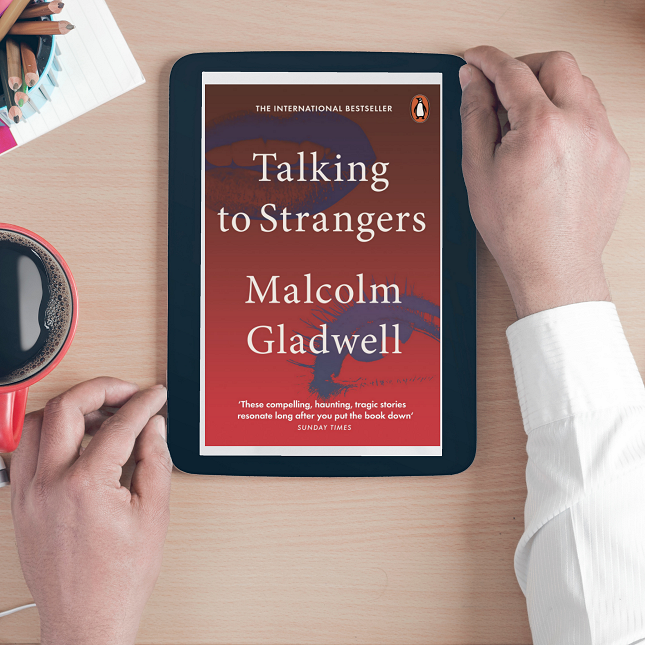Malcolm Gladwell’s ‘Talking to Strangers’: what we assume and why it matters

At Ability Consultants we have spent a whole bunch of time and effort thinking about and building a structure around what Positive Behaviour Support is and can be. We focus on the who, what, when and how we can deliver better support, better plans, better strategies. That’s what excites me about work in this team – we care about what we do.
But I recently re-read (or I should say re-listened to on Audible) Malcolm Gladwell’s 2019 social psychology analysis ‘Talking to Strangers’. It really crystallised in my head and heart this time – it talks in detail about WHY we seek to understand strangers and the assumptions that all too often trip us up along the way.
Talking to Strangers is new
The first startlingly obvious revelation the book makes is that talking to someone you don’t know at all is, in social evolutionary terms, very new. Using the fabled but all too real struggles of Cortés and Montezuma as an example, Gladwell examines the massive influence communication and transportation technologies have had on how we talk to other people. 500 years ago if I wanted to communicate with another human I DID NOT already know I’d have needed to either walk or ride a horse for many hours or write a single copy of a letter. Mostly I would talk to people I already knew. The printing press, the postal system, fast transportation, radio, television, the telephone and now the internet have all completely changed that. All within a dozen or so generations.
I recently represented Ability Consultants at the Shoalhaven Disability Expo: I talked to strangers all day, figuring out what they wanted, if I could be useful and how. Only as we began packing up did I run into someone I’d spent huge slabs of work and social time with 20 years ago. It struck me again: I spend most of my work days trying to understand and engage with humans I know relatively little about. That can sure be exhausting. So why do I do it? Why do we? Because we assume that our experience, our specialist knowledge, our effort can be of benefit to them.
Talking to strangers is hard
Gladwell’s three main concerns are about the assumptions we necessarily but sometimes mistakenly make:
1: Default to truth — Gladwell devotes significant time to psychologist Tim Levine’s notion of Truth-Default Theory (TDT): that most people will, most of the time, assume that people are telling the truth until enough doubt overcomes that default position. We assume truthfulness in the plainest sense, despite our knowledge of the complexity and nuances of human interaction.
2: Transparency — “the assumption that people's behaviour and demeanour – what they represent themselves on the OUTSIDE – provides an authentic window into the way they feel on the INSIDE.”
3: Coupling — the idea that behaviours are linked to very specific circumstances and conditions. “The first set of mistakes we make with strangers—the default to truth and the illusion of transparency—has to do with our inability to make sense of the stranger as an individual. But on top of those errors we add another, which pushes our problem with strangers into crisis. We do not understand the importance of the context in which the stranger is operating.”
Working together, these assumptions make us very bad at authentically understanding strangers. These assumptions contribute to world wars and bad dates, misjudgements and missed opportunities to connect with each other.
So …. Stop talking to strangers
I was compelled again by this very readable, if at times confronting book: I am not capable or equipped to understand the behaviour of strangers. So I’m left with no option but to redouble my efforts at getting to know my clients, their context and their ways of knowing about the world. I must first become not-a-stranger to them, and second seek to empirically understand their behaviour in space and time and as a function of their relationships. I must practice curiosity and humility before I make assumptions and draw conclusions.
In practical terms this means that both devoting time to communication and robust collection of high quality data MUST necessarily precede my formulation. It means that I must hold my intuition accountable to my observation. It means that if we are for real (and we are) there are no shortcuts.
“The thing we want to learn about a stranger is fragile. If we tread carelessly it will crumple under our feet... The right way to talk to strangers is with caution and humility.”
― Malcolm Gladwell, Talking to Strangers: What We Should Know About the People We Don’t Know (2019 – Little, Brown and Company)
Stephen Holmes is a Behaviour Support Practitioner and Team Leader on the south coast of NSW. He holds a Masters of Criminology (Sydney Law School) and is a Member of Behaviour Analysis Australia.





